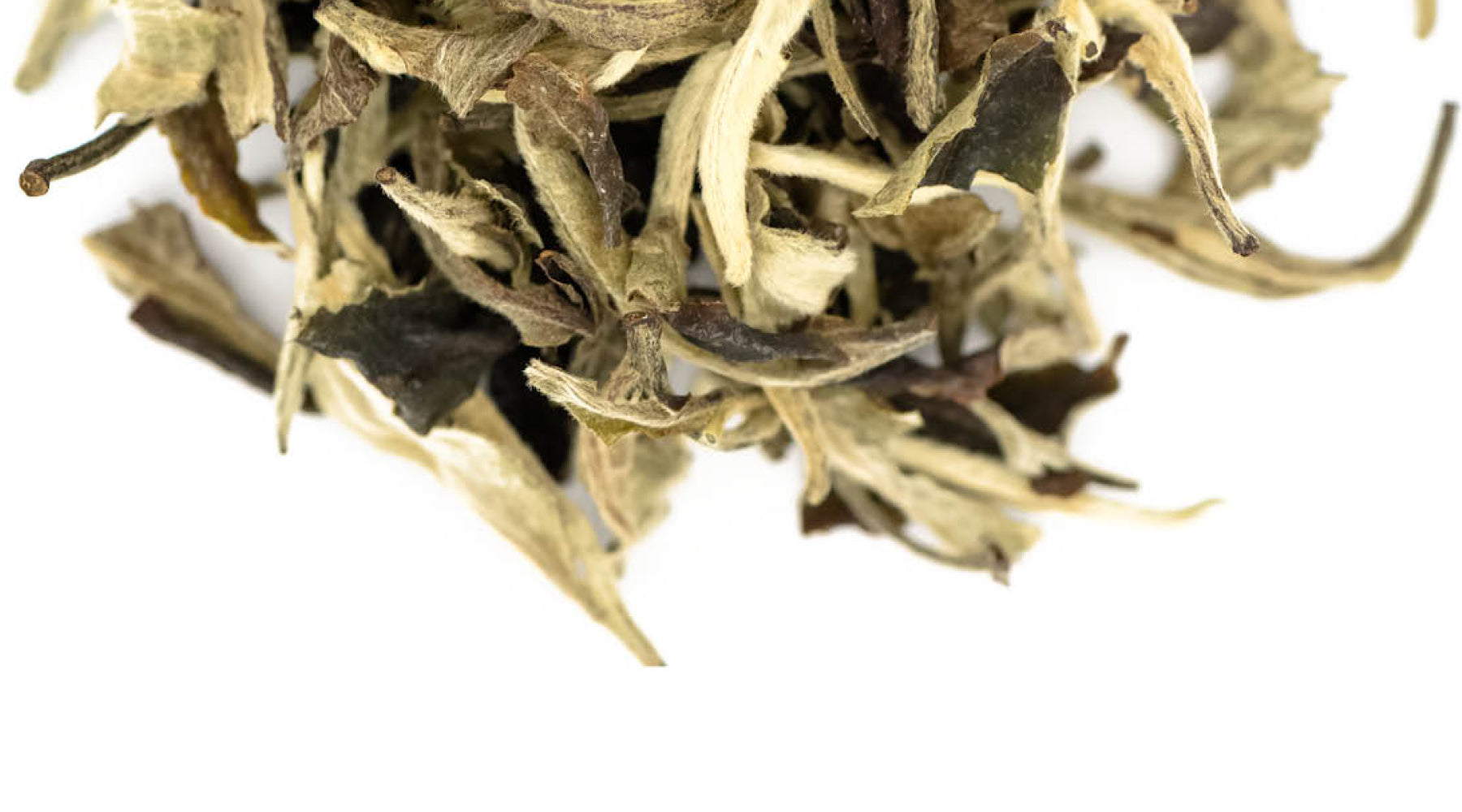What is White Tea?
If you're new to tea, your immediate answer to this question would very likely be "well, that's just tea with milk, isn't it?". And you couldn't be blamed for giving such a bleedingly obvious answer, after all, the milky question always posed is "would you like your tea white or black?".
For the ever-so-slightly more seasoned tea drinker, real white tea is one of those special teas that is full of fascination, mystery and luxury that has nothing to do with milk, sugar, or any hideous additive you may think of adding to your brew.
White tea is this strange thing even the international tea community cannot agree on fully, except for a few characterising elements. Namely, when it comes to white tea production, white tea is neither oxidised nor rolled. "Oxidised or what?" I hear you.
Put simply, the flavour of real white tea is "lighter" than most green and traditional black teas. Think light floral, nutty, with natural sweetness. Think delicate flavour.
And if we're going to throw in a few other generalisations that definitely don't always fit the mould, white tea is generally the least processed of all tea varieties (when I say "all tea varieties", I mean white tea, green tea, oolong tea, black tea, pu-erh tea and even yellow tea - yes, there is such a thing as yellow tea"). Often white tea refers to tea leaves and young tea buds that are merely picked and dried in the natural sun.
Incidentally, the white tea plant is the same plant as the green tea plant, black tea plant and so on - the camellia sinensis plant. And it typically uses young tea leaves. The old ones are reserved for your supermarket teabags.
How to Make White Tea?
I'm assuming when you ask this, you're not wondering how to grow, pick and process the actual leaves to make white tea, because you may as well be asking me how to plant a lime tree without killing it (let's not go there). I am a tea drinker, not a tea farmer, my thumb is definitely not green, so let's keep to the script.
So you want to know how to brew real white tea - loose leaf tea. And what a clever question to ask. Obviously you realise that dousing tea leaves with boiling water doesn't always cut it, unless said tea leaves are Tetley's finest floor-sweepings.
Temperature
White tea leaves are far more delicate than black tea leaves, but not nearly as pesky and over-sensitive as green tea. If you pour boiling water on green tea, you'll soon be preaching with the uneducated millions that green tea is horridly bitter and should really only be drunk for its health benefits. We warned - do NOT pour boiling water on green tea, it ain't pretty.
White tea will give a fine performance with a dash of TLC. Bring the water to 70 degrees, a few degrees more won't hurt, and then let the magic happen.
Time
How long to brew? Take a close look at your white tea leaves. Are they mostly leaves, broken into fine pieces? If so, throw them in the bin and find yourself a better leaf. I mean, around three minutes is enough for this type of brewed white tea. And what if your leaves are more like long needle-like, grey hairy pieces? Those are the large and beautiful tea buds, and you can bet there are nice things awaiting (and whoever bought them for you likes you a lot, those things are expensive)! When brewing, be patient, the flavours will take a lot longer to release. Try brewing around 4-6 minutes. And don't you dare throw them out after one brew, it's like leaving the party before the cake comes out. Add more hot water for a second or third brew.
What if you have a mix of both leaves and buds? It doesn't hurt to brew a little longer, because those buds still need a good 4-6 minutes to start singing for you.
Teaspoons
You can throw out that old "one teaspoon per cup and one for the pot" rule when it comes to measuring white loose leaf tea. Those leaves and buds vary more in shape and size than Australian women's clothing sizing standards.
Measuring white tea with a teaspoon is like sending your six-year-old son to paint Aunty Flo's back porch. Unless you have mini scales to measure your leaf, there's no saying what will happen, or if anything will even survive. But never mind, guaranteed Aunty Flo will still think what you did is just darling, and sometimes that enough, isn't it?
And if you have a set of those mini scales I just mentioned? Try 1gm tea/100ml water. If you don't? Learn to love the unpredictable!
White Tea Benefits - What is White Tea Good For?
The question should really be, what is white tea not good for?
After I give you the lowdown, you'll want to kiss me and give me all your money. No kidding. I'm about to save you thousands in therapy and plastic surgery.
Here it is: white tea makes you happy and supports delightfully elastic skin!
I'm not going to go into all the other boring benefits, because there are long, well-cited articles you can find on Google search I couldn't even re-write if I tried, but let's just focus on these two white tea benefits you're going to love the most.
Tea has this delightful amino acid called "theanine". Theanine is particularly potent in white tea. It acts by increasing dopamine levels in the brain which makes you feel happy! It also has a flow-on effect to other areas of brain health - memory, concentration, better-behaved husbands etc etc.
And as for skin elasticity, let me educate you. Collagen and elastin. You know what I'm talking about. Collagen is a protein that's found in connective tissue which supports both skin strength and elasticity. Elastin is another structural protein found in the skin which also maintains skin elasticity while aiding in wound repair. When these two babies breakdown, age-related wrinkles and saggy skin starts to form. Lovely.
Researchers have found that white tea helps to prevent this breakdown, which could mean stronger, suppler skin! (I write "could" because let's face it, we all know it's not guaranteed.)
How Much Caffeine in White Tea?
Now you're testing me. According to Google's top answer, white tea has a little less caffeine than a cup of green tea (30-55mg per 8oz cup). And that would be nice and easy if all white teas were the same, wouldn't it? But alas, they are not. Remember those teaspoons?
The only correct answer is - it depends. How fresh the tea is, the leaf type, how much you brew, how long you brew, if you are rebrewing etc. But yes, there is definitely caffeine in white tea that ought not to be sneezed at.
My advice? Don't drink any tea from the white tea category before going to bed unless sleep is not on your agenda. Morning is the finest time of day to drink white tea.
White Tea vs Green Tea?
So many questions! Well, I have already told you that white tea is lighter in flavour and lower maintainance than green tea. White tea is neither oxidised or rolled. It is also typically completely unprocessed, delightfully well natured and packs a punch of antioxidants. Just a little picking and drying generally does the trick.
Green tea, on the other hand, is a life full of complication and drama. Yes, there are still many delicious antioxidants, although not as many as white tea, and processing is far more involved. Green tea leaves are "unoxidised", and to do this, there is an extensive process of steaming, firing, rolling, repeat etc etc. Wait until I tell you about oolong tea...
Calories in White Tea?
Would you believe people around the world ask Google about calories in tea more than 5,000 times per month? No kidding!
The answer is so delightfully simple.
You will find absolutely ZERO calories in a cup of white tea. Unless you add milk. Or sugar. Or honey. And if you do that, you deserve to have every single one of those calories multiplied and dispersed forever around your waistline. Because white tea is the divine liquid from heaven and should never be tainted with anything other than fresh, clean water.
If you want to know more about calories in tea, check out my recent blog How Many Calories in a Cup of Tea?
What an exceptional tea selection? Check out Tielka's White Tea Colleciton of Moonlight White Tea, a rare and exquisite tea.


